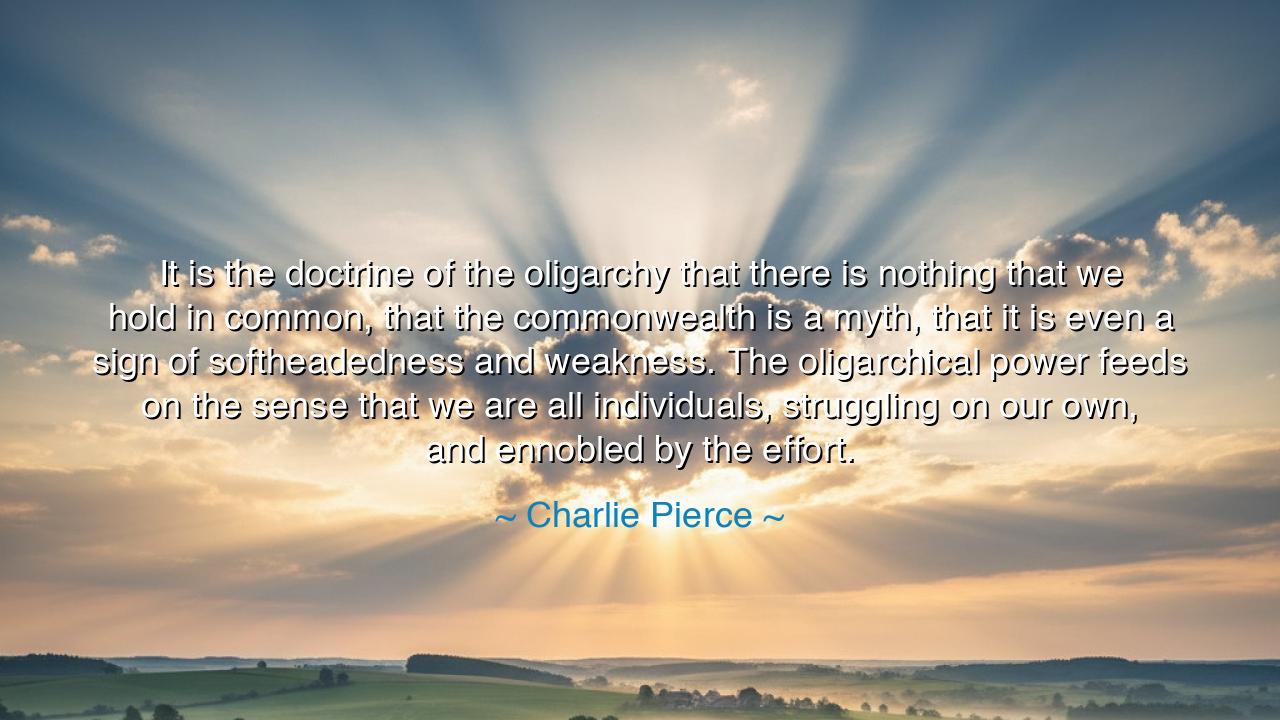
It is the doctrine of the oligarchy that there is nothing that
It is the doctrine of the oligarchy that there is nothing that we hold in common, that the commonwealth is a myth, that it is even a sign of softheadedness and weakness. The oligarchical power feeds on the sense that we are all individuals, struggling on our own, and ennobled by the effort.






In the words of Charlie Pierce—“It is the doctrine of the oligarchy that there is nothing that we hold in common, that the commonwealth is a myth, that it is even a sign of softheadedness and weakness. The oligarchical power feeds on the sense that we are all individuals, struggling on our own, and ennobled by the effort.”—there is a warning against the most insidious of lies: that society is nothing, that only the individual matters, and that strength lies in isolation. The oligarchy thrives not merely on wealth and power, but on the division of the people, convincing them that solidarity is foolishness and that the commonwealth is an illusion.
The ancients understood this danger well. Aristotle taught that man is by nature a political animal, bound to others in the fabric of the polis. To deny this was to deny the very essence of humanity. Yet tyrants and oligarchs throughout history have sought to dissolve this bond, whispering that each man must toil alone, that cooperation is weakness, and that compassion is folly. In this way, they isolate the many, while the few consolidate their rule.
Pierce unmasks this deception: the power of the oligarchy grows not by honest labor, but by sowing distrust among the people, persuading them to prize individual struggle over collective strength. For a divided people cannot resist, while a united people can topple empires. This is why Rome fell not only to external foes but also to internal decay, as the wealth of the patricians grew vast, and the plebeians were told that their grievances were their own fault, not the wound of a broken society.
History gives us further witness. In the Industrial Age, oligarchs declared that the worker’s poverty was a sign of his weakness, while their own riches were proof of merit. But when workers joined in unions, reclaiming the truth of the commonwealth, the power of the few was checked, and new protections were won. It was solidarity, not isolation, that restored dignity to the many.
Thus, let this teaching endure: the myth is not the commonwealth, but the lie that we are meant to live only for ourselves. True nobility does not come from solitary struggle, but from the strength of communities bound together by justice, compassion, and shared destiny. Pierce’s words call us to remember that every oligarchy thrives on division, but every people rises when they reclaim what is truly theirs: the sacred bond of the common good.






KAKim Anh
What strikes me most here is the psychological insight. If people are made to feel alone in their efforts, they’ll never unite to challenge injustice. It’s a strategy as old as history—divide, glorify independence, and rule. But what if we redefined strength as interdependence rather than isolation? I wonder if humanity’s next evolution must be moral and communal, not just technological.
ANAnhh Ngoc
This is a powerful reflection on how ideology can shape society’s values. It suggests that the ruling elite sustains itself by convincing people that unity is weakness and struggle is virtue. That inversion of morality is frighteningly effective. It raises a complex question—how can people rebuild solidarity when individualism has been sold to us as freedom for so long?
GDGold D.dragon
I find this statement deeply unsettling because it hits close to home. So much of today’s culture celebrates self-reliance to the point where community feels like an outdated concept. The idea that power thrives on isolation makes me wonder—have we been manipulated into believing that competition equals progress? Maybe rediscovering the value of the common good is the only way to resist such control.
PHPhuong Ha
This quote feels like a sharp critique of modern society. It captures how power structures benefit from dividing people and glorifying individual struggle. It makes me think about how often we’re told that independence is noble while cooperation is seen as weakness. Is this mindset intentionally cultivated to keep people from realizing their collective strength? It’s a chilling but thought-provoking idea.